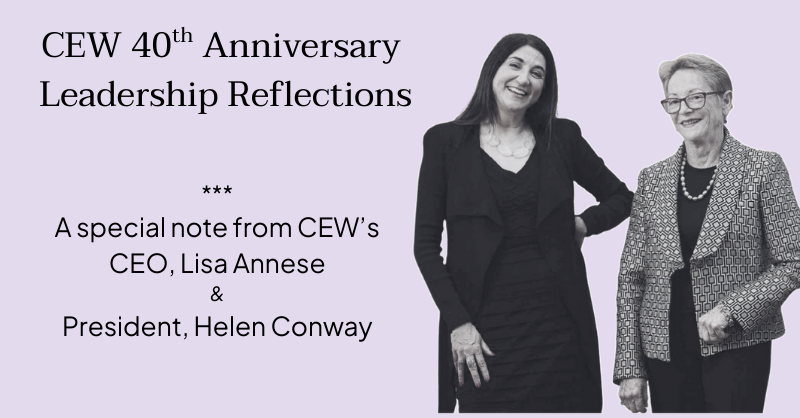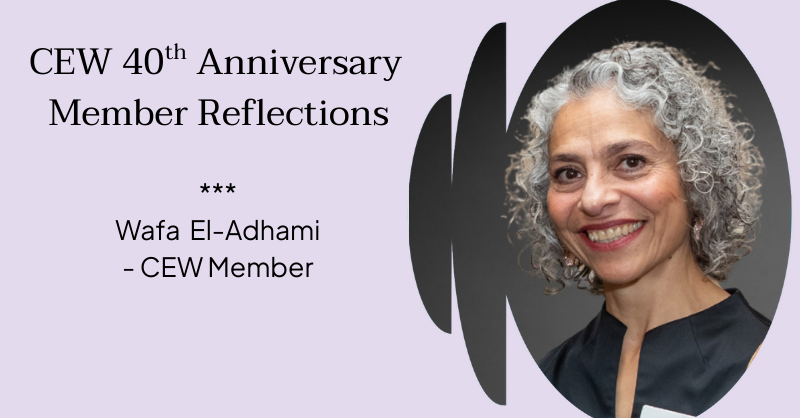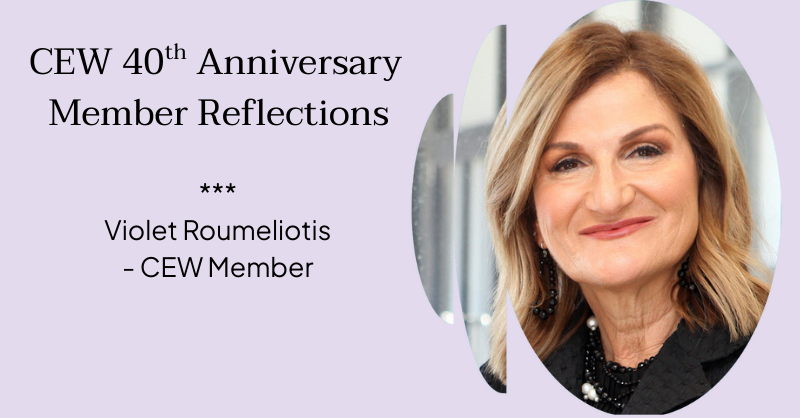Member Reflections: Violet Roumeliotis AM

Introducing - Violet Roumeliotis AM
CEW Member Since: 2021
State Chapter: NSW
I’m an executive leader and advocate for equality and a diverse Australia. I have spent close to 40 years leading for-purpose organisations, providing human services that promote equal opportunity and change the lives of individuals and families experiencing inequality.
Something that has been important to me in my career is showing other women from diverse backgrounds that there is no limit to what we can achieve. I've looked for ways to create opportunities where there are currently barriers ― barriers that pigeon hole migrant and refugee women and keep them from achieving their full potential.
I know that women from diverse backgrounds are as skilled, courageous and resourceful as the next person. What is often missing, however, is the opportunity to fully participate and share those skills and knowledge. As a body, the power of CEW is to open doors for other people and to create a seat at the table for women from all walks of life.
Violet, what led you to become a member of CEW, and how has your membership influenced your professional or personal journey?
I knew former CEW President Her Excellency the Honourable Sam Mostyn AC and had been impressed with her efforts to ensure the diversity of CEW’s membership went beyond gender, and encompassed other aspects of our identity, such as culture and language. This encouraged me to become a member – because we need to see more women from all backgrounds in corporate and executive environments.

Violet Roumeliotis AM and Sam Mostyn AC
What CEW experience has resonated with you the most?
I had a conversation with CEW member Ming Long AM in 2021 that persuaded me of the value of CEW. I’d had a negative experience with a CEW member some years beforehand and was cautious - I wasn’t sure it was a space where I fit or that aligned with my values. But I was drawn to the vision Ming and many others shared for the organisation – founded on true equality, beyond the bounds of just gender.
Since then, I’ve had numerous interactions with CEW members that have resonated deeply, such as with Dr Cassandra Goldie – a fierce advocate for gender equality who greatly values and supports diversity and inclusion – or with Her Excellency the Honourable Sam Mostyn AC, who has taken a principled position in standing up for multicultural women to ensure we are equally valued, included and heard.
CEW’s mission is ‘Women Leaders Empowering All Women’ - what does this mean to you?
I had always felt a bit of imposter syndrome when I went into spaces like the ones CEW occupies. Coming from the community and for-purpose sector, I was never sure how I’d be received in spaces that had traditionally been more corporate. But what I found was a group of women deeply committed not only to leadership, but to inclusive leadership. When I reflect on CEW’s changing role over the years, what stands out to me is the organisation’s evolved focus on equity beyond gender and the importance of intersectionality.
Today, there is a clear recognition that you can’t empower all women unless you are actively including First Nations women, women from culturally and linguistically diverse backgrounds, and women who have historically been marginalised or excluded from power. That shift has strengthened CEW. It has ensured CEW is aligned with the realities of leadership in Australia today and that every woman, no matter her background, has a seat at the table.
Over the years, CEW has partnered with the organisation I lead, Settlement Services International (SSI), and the Diversity Council of Australia to deliver a number of projects that recognise the need for bespoke solutions to intersectional challenges facing women from diverse backgrounds. For example, the RISE Project (Realise. Inspire. Support. Energise.) aims to help culturally and racially marginalised (CARM) women progress to leadership positions.
The project worked with big employers to assess their organisation’s racial literacy and introduce tailored action plans, including built-in training from DCA and SSI on anti-racism and cultural responsiveness, respectively. Importantly, SSI worked with CARM women in these organisations to develop individualised career support plan and leadership program opportunities, including CEW’s Leaders Program.
To remain true to the mission into the future, CEW will needs to continue to embrace diversity and intersectionality by supporting those that are struggling to progress in leadership due to structural disadvantage.
Do you think there will always be a place for a membership organisation like CEW for future generations?
CEW has the ear of the government, being such a respected organisation of 40 years' standing. Many of its members relate to influential people, therefore it provides an important ingredient supporting change – its extensive networks. CEW’s new CEO, Lisa Annese, is a formidable advocate with an appetite for change, and I have no doubt we will see another period of positive reform under her leadership.
Read more stories


